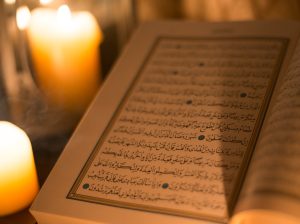Celebrating Easter: egg-stra special traditions from an interfaith home

Photo Credit: Photo via Wikimedia Commons under Creative Commons License
Pictured is a Greek Orthodox alter decorated for an Easter service, called an Epitaphios. Placed on it is a decorated Bible, and red eggs that symbolize Jesus Christ’s blood.
April 17, 2023
I grew up in a Roman Catholic-Greek Orthodox interfaith home. I am of the Greek Orthodox faith. However, I still celebrate Roman Catholic holidays because of my father. Celebrating Easter was always hectic but nevertheless provided wholesome family memories I’ll cherish forever.
Roman Catholic Easter
The Roman Catholic Church marks Easter as the first Sunday that follows the first full moon of the Spring Equinox. Because of this, the date of the holiday changes each year. Easter Sunday marks the ending of Lent and is the last day of the holy week. It celebrates Jesus Christ’s resurrection from the dead. This is why “Christ is Risen” is said on this day. Roman Catholics often fast prior to Easter to perform an act of penance for their sins. Easter celebrations often have delicious foods such as ham and other meats because of this.
Greek Orthodox Easter
Greek Orthodox Christians celebrate Easter for the same reasons as Roman Catholics. The only difference between the two Easters is the date. Greek Orthodox Easter often falls on a different date than Roman Catholic Easter. This is because the Greek Orthodox one is calculated according to the Julian calendar. The Roman Catholic Easter is calculated according to the Gregorian calendar. Greeks say “Χριστός ανέστη,” which is “Christ is Risen.” They also partake in Lent and fasting as well.
Blending both
I grew up spending time with predominantly my father’s family who are all Roman Catholic. This means that Greek traditions were never really present in my life for this holiday. Easter egg hunts and roasted ham will be in my mind forever. When Greek Orthodox Easter rolls around my mother, sister, and I go to our church for a service. This is really the only aspect of my religion and culture that I embrace at this time. Most Greeks eat roasted lamb for Easter; we do not. I wish I could indulge in my religion and culture more. However, I’m never surrounded by anyone that celebrates the same things as me. I always felt a bit uncomfortable celebrating Roman Catholic holidays because my family would never fail to point out that I, in fact, was not Roman Catholic.
My Catholic grandmother would bring my sister and me to her Catholic church for Ash Wednesday. All of the churchgoers would stare at us because they didn’t recognize us as part of the parish. This division was always confusing and uncomfortable, especially as a young child.
One tradition that I do with my mom involves dying Easter eggs. Greeks dye eggs red to symbolize Jesus Christ’s blood. Then we play a game that involves hitting two eggs together. The egg that cracks is the loser. These red eggs are often baked into a bread. This bread is tsoureki. The bread is sweet and delicious and makes really good French toast. A coin is also baked into the bread. Whoever finds the coin in the bread is said to have good luck for the following year.
Other inter-faith homes
Soula Morales is a Greek Orthodox housewife. She is married to a person of Roman Catholic faith. However, her husband converted to Greek Orthodox because their son is baptized Greek Orthodox. He wanted all three of them to be a part of the same religion. Soula says that her husband likes to celebrate his wife’s religion, though as it’s a new experience for him.
The week leading up to Easter, Soula and her family fast until Saturday. Then they go to church on Saturday night and receive the holy light, and then they can eat. When they get home her family eats a soup with meat that she had already prepared and cracks the red eggs. Soula’s family also eats tsoureki during Easter. On Sunday, they roast lamb and have a big feast which is what most Greeks do. When asked how she feels about her Greek heritage, Soula says she is, “Proud to be Greek and follow the religion of her people. It’s very important believing in the manifestation of God and what he has created for us and our people. Orthodox is very special and makes me very proud since it is my heritage. It’s what we believe in.”








